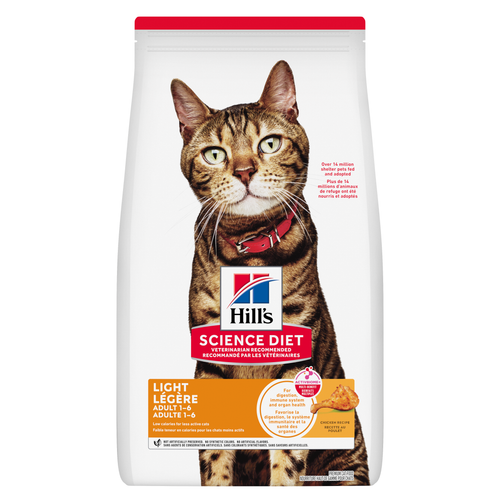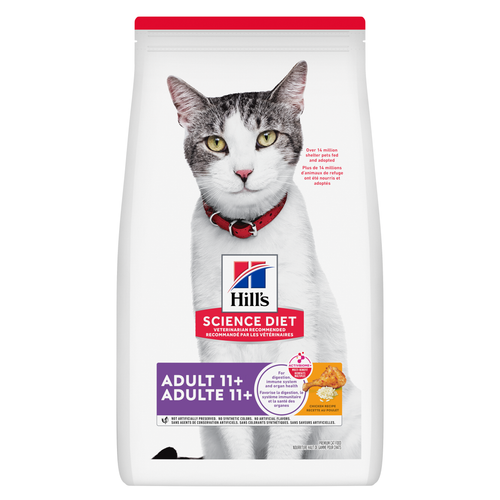
-
Find the right food for your petTake this quiz to see which food may be the best for your furry friend.Find the right food for your petTake this quiz to see which food may be the best for your furry friend.Featured products
 Adult Light Large Breed Chicken Meal & Barley Recipe Dog Food
Adult Light Large Breed Chicken Meal & Barley Recipe Dog Food18% lower calories vs. Science Diet Large Breed Adult
Shop Now Adult Healthy Mobility Small Bites Chicken Meal, Barley & Brown Rice Recipe Dog Food
Adult Healthy Mobility Small Bites Chicken Meal, Barley & Brown Rice Recipe Dog FoodAdvanced nutrition to support hip & joint health from day 1
Shop Now Adult Sensitive Stomach & Skin Small & Mini Chicken Recipe Dog Food
Adult Sensitive Stomach & Skin Small & Mini Chicken Recipe Dog FoodHill's Science Diet Sensitive Stomach & Skin Small & Mini dry dog food is tailored nutrition for Small & Mini dogs while being gentle on stomachs. Nourishes skin & promotes a lustrous coat.
Shop NowFeatured products Adult Light Chicken Recipe Cat Food
Adult Light Chicken Recipe Cat Food20% lower calories vs. Hill's Science Diet Adult
Shop Now Adult Healthy Cuisine Seared Tuna & Carrot Medley Cat Food
Adult Healthy Cuisine Seared Tuna & Carrot Medley Cat FoodDelicious seared tuna paired with tender carrots in a mouthwatering sauce
Shop Now Adult 11+ Chicken Recipe Cat Food
Adult 11+ Chicken Recipe Cat FoodSupports brain health & beautiful fur. Helps keep immune system, heart & kidneys healthy.
Shop Now -
Dog
- Dog Tips & Articles
-
Health Category
- Weight
- Food & Environmental Sensitivities
- Urinary
- Digestive
- Joint
- Kidney
- Dental
- Cancer
-
Life Stage
- Puppy Nutrition
- Adult Nutrition
- Senior Nutrition
Cat- Cat Tips & Articles
-
Health Category
- Weight
- Skin & Food Sensitivities
- Urinary
- Digestive
- Kidney
- Dental
- Stress
- Cancer
-
Life Stage
- Kitten Nutrition
- Adult Nutrition
Featured articles Water
WaterDiscover why water is the most important nutrient for your dog or cat to live a healthy life. Find out how much water your pet should consume each day.
Read More Antioxidants
AntioxidantsUnderstand the importance of antioxidants in your dog or cat's food, and how they can help protect your pet and keep them healthy.
Read More Importance of DHA in your Pet's Food
Importance of DHA in your Pet's FoodLearn about DHA, Docosahexaenoic Acid, a natural omega-3 fatty acid that is essential in the development of the brain and nervous system in cats & dogs.
Read More -


Traditional cat litter boxes are tried-and-true, but are you curious about the potential conveniences afforded by a smart litter box? Here's why investing in a self-cleaning litter box could be a good option for you and your kitty.
Thinking Outside the (Litter) Box
While they might sound like a thing of the future, robotic litter boxes arrived on the market about 20 years ago. Generally, these litter boxes have three main components:
- A sensor that tracks when a cat enters and leaves the box
- A raking implement or spinning mechanism
- A waste receptacle
About 15 to 20 minutes after the sensor recognizes that your cat has left the box, it will rake, spin or flush the waste. A sifting mechanism then removes the waste and drops it into a tray. Depending on the model, the tray may either be reusable or disposable.
For an even more sophisticated option, you can opt for a robotic litter box that runs on Wi-Fi and centrifugal force. This type of model has a light that alerts you when it's time to change the litter and offers the option to control the box from your phone.
Benefits of a Smart Litter Box
Perhaps the greatest benefit of using a smart litter box is that you'll spend less time scooping and sifting. Many models allow cat parents to empty and clean the tray or compartment just once a week instead of once or twice a day. Who doesn't like the sound of that?
And, while it's still important to have someone check on a smart litter box if you leave your cat at home for an extended period of time, a self-cleaning unit drastically cuts down on the work your kitty sitter has to do. A self-cleaning litter box also helps reduce odor, which is especially helpful if your feline friend isn't the best at covering up their waste.
The Cost of a Self-Cleaning Litter Box
The cost of a self-cleaning litter box varies from model to model. Automatic litter boxes cost between $20 and $200, while smart or robotic boxes start at around $450 and can run up to $700. These prices don't include the costs of accessories and replacement parts.
Keep in mind that many units require a certain type of litter, such as clumping or crystals. If you don't use the right litter, the box can malfunction and could be costly to repair. It's also recommended that you have one more litter box than the number of cats you have, says the Pet Health Network. This further drives up the expense of having a self-cleaning litter box.


Tasty Tips
Transitioning to a New Box
Switching your cat to a new litter box takes time and patience, so try not to get discouraged. To get started, follow the manufacturer's instructions to set up the box and place it somewhere that offers your kitty some privacy.
Transitioning your cat to a self-cleaning litter box is kind of like potty training a kitten. Give your cat the option of using their current litter box or the new one, but don't turn on the new box until your cat is comfortable around it. Once they seem comfortable with it, spend about a week observing your kitty's behavior around the litter box.

Not all cats will acclimate well to the sounds and mechanics of a self-cleaning litter box. Cats who are unnerved by going to the bathroom in a machine might try to avoid it. They may hold in their waste, which can lead to health problems, or eliminate their waste outside of the box, which isn't healthy for them or for you.
When deciding whether to invest in a robotic litter box, be sure to take your cat's age into consideration. Kittens are likely to have an easier time than older cats adapting to a smart litter box.
Before making the decision to switch to an automatic box, compare the costs with the time-saving benefits. In some instances, the cost of purchasing and maintaining a robotic litter box may be prohibitive. What's most important is to stick with the box your cat will use. Whether you go with an automatic litter box or a traditional one, make sure your decision is based on what's best for your kitty's health and happiness.


Christine O'Brien is a writer, mom, and long-time cat parent whose two Russian Blues rule the house. Her work also appears in Care.com, What to Expect, and Fit Pregnancy, where she writes about pets, pregnancy, and family life. Find and follow her on Instagram and Twitter @brovelliobrien.
Related products

With delicious chunks in a decadent gravy

Supports brain health & beautiful fur. Helps keep immune system, heart & kidneys healthy.

Delicious seared tuna paired with tender carrots in a mouthwatering sauce

20% lower calories vs. Hill's Science Diet Adult
Related articles

When you adopt a cat, you don't just gain a best friend; you also save her life. Here's why getting a cat from a local animal shelter makes so much sense.

Discover how to train your cat, starting with very basic first steps that both reward good behavior and discourage the bad.

Discover the benefits of Hill's line of kitten foods and how they provide complete and balance nutrition for growing kittens.

Cats are naturally very clean and chances are your kitten will already have learned how to use the litter box from her mother before she comes to live with you.

Put your cat on a diet without them knowing
Our low calorie formula helps you control your cat's weight. It's packed with high-quality protein for building lean muscles, and made with purposeful ingredients for a flavorful, nutritious meal. Clinically proven antioxidants, Vitamin C+E, help promote a healthy immune system.
Put your cat on a diet without them knowing
Our low calorie formula helps you control your cat's weight. It's packed with high-quality protein for building lean muscles, and made with purposeful ingredients for a flavorful, nutritious meal. Clinically proven antioxidants, Vitamin C+E, help promote a healthy immune system.


